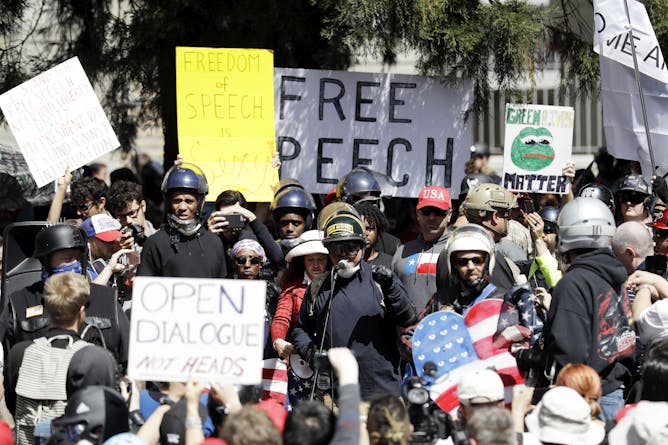|
|
|
Editor's note
|
|
Aristotle coined the term “enthymeme” to explain how different words and arguments resonate in one community but not in others. What was persuasive in Athens, he noted, might not play in Sparta. According to Texas A&M rhetorical scholar Jennifer Mercieca, the enthymemes that used to undergird American culture and politics are starting to disappear. “Without a mutually shared understanding of facts, words and values, a
culture cannot endure,” she writes.
University campuses are natural places for difficult discussions about why the same words can mean different things to different people. But how does one promote free speech on campus and still maintain safety and an inclusive environment? This August will mark one year since the white supremacist rally on the grounds of the University of Virginia and the tragic death of a counter-demonstrator. We asked three university presidents –
Connie Ledoux Book of Elon University, Ana Mari Cauce of the University of Washington and Clayton Rose of Bowdoin College – whether free speech should be treated differently on campus than in the rest of society, and if so, how?
And pretty much anyone who’s lived with a pet has wondered how old their furry friend is in “dog years” or “cat years.” Mississippi State’s Jesse Grady explains that veterinarians like him are more concerned about what stage of life your companion animal is in rather than an exact number – but he’ll help you out with some rough age equivalents too.
|
Nick Lehr
Arts + Culture Editor
|

|
|
Top stories
|

The culture war isn’t just playing out on the streets. It’s also a struggle over the dominant understanding of certain words.
AP Photo/John Minchillo
Jennifer Mercieca, Texas A&M University
Aristotle coined the term "enthymeme" to refer to arguments, words and ideas that are broadly accepted among the people of a nation. So what happens when enthymemes start to disappear?
|

A crowd gathers around speakers during a rally for free speech near the University of California, Berkeley campus.
Marcio Jose Sanchez/AP
Ana Mari Cauce, University of Washington; Clayton Rose, Bowdoin College; Connie Ledoux Book, Elon University
As the one-year anniversary of the tragedy in Charlottesville nears, we asked the presidents of Bowdoin, Elon and the University of Washington whether free speech should be treated diffferently on campus.
|

Did anyone check the number of candles on here?
KikoStock/Shutterstock.com
Jesse Grady, Mississippi State University
Based on his age in 'dog years,' could your animal pal legally buy alcohol? Or would he be cashing in on his senior discount? Veterinarians are more interested in life stage than a particular number.
|
|
|
Politics + Society
|
-
Dov Waxman, Northeastern University
Rather than transform Israel into an undemocratic 'apartheid' state, the new nation-state law is more likely to ensure that Israel can't be transformed into a liberal democracy or binational state.
-
Brian Taylor, Syracuse University
When Putin looks in the mirror, what does he see? Not an aggressor as so many are depicting him in the West, but rather a defender of a wounded and misunderstood nation.
|
|
Economy + Business
|
-
Sheila Tschinkel, Emory University
President Trump has been attacking the Fed's current policy of slowly raising interest rates. A former central bank official explains why that's so troubling.
-
Daniel Hemel, University of Chicago
There are other ways for the state to make the president's tax returns part of the public record that are more likely to work.
-
Ken Albala, University of the Pacific
Canada recently slapped a tariff on US exports of the tomato-based condiment, and the EU plans to do the same, perhaps on the notion that it's distinctly American. In fact, ketchup’s origins are global, as are its fans.
|
|
|
|
|
|
Trending on site
|
-
Frans von der Dunk, University of Nebraska-Lincoln
Forty-nine years ago, on July 20, 1969, American astronauts planted a US flag on the moon. A space lawyer explains the implications, who owns the moon, and what it means for lunar mining.
-
Rebecca Moore, San Diego State University
Forty years ago, Rebecca Moore's two sisters helped plan the Jonestown massacre. But she refuses to say they were brainwashed, arguing that it prevents us from truly understanding their behavior.
-
Jacob Neiheisel, University at Buffalo, The State University of New York
The president won't be removed from office until Republicans in the House decide to support the idea – or the midterms hand the Democrats more seats.
|
|
Today’s chart
|
-

 |
Peter Gall
West Virginia University
|
| | | |
| |
|
|
|
|
|
|
|